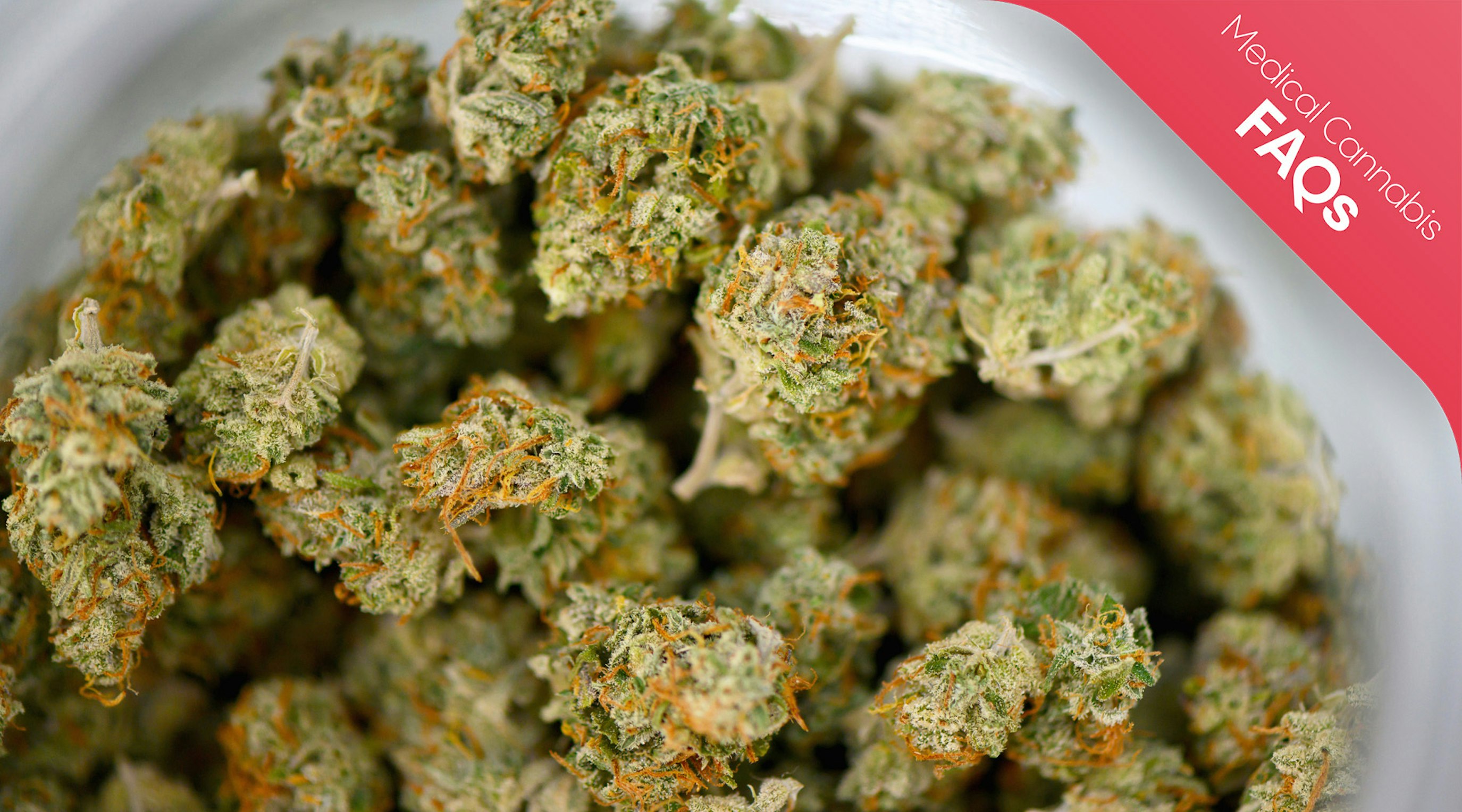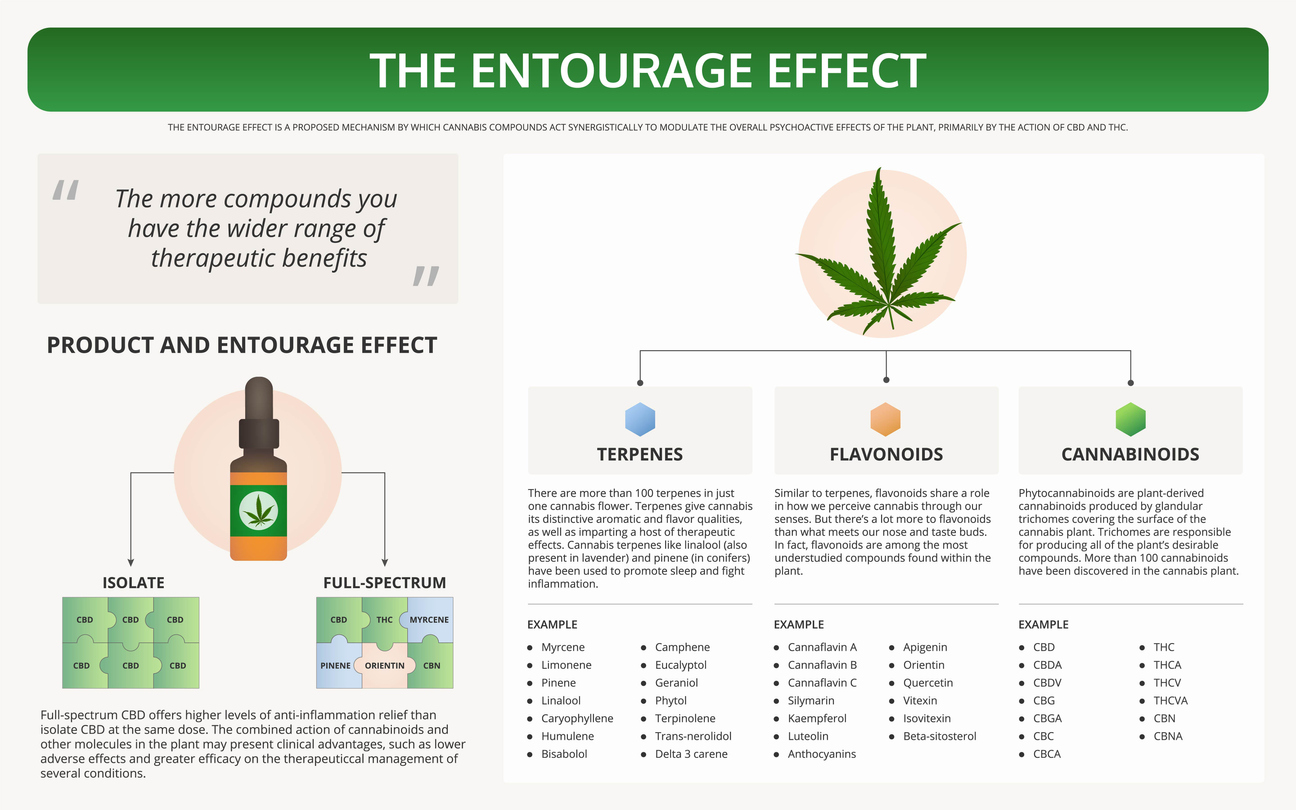Contents
The cannabis plant, and cannabis-based medicines, are made up of different component or compound classes including cannabinoids, terpenes, and flavonoids. It's believed that all three play a role in the entourage effect, and each use their own unique properties to further enhance or facilitate the effects the other compounds can have on the body.
But first, it’s important to understand:
What are cannabinoids?
Cannabinoids are a class of chemical compounds that bind to cannabinoid receptors in our endocannabinoid system. Our bodies naturally produce endocannabinoids to bind with these receptors, and cannabis plants naturally produce phytocannabinoids, more commonly known as cannabinoids, like THC, CBD, CBG, CBN and CBC.
When cannabinoids are consumed they can influence the activity of endocannabinoids, their receptors and the typical messages, to have a variety of effects. Some of these effects, like reducing inflammation or pain, relieving anxiety and spasticity, or improving appetite and sleep, can be utilised, and applied, for medicinal and therapeutic purposes.
What are terpenes?
Terpenes are a chemical group, naturally produced by plants. Known to contribute to the plant’s aroma and their therapeutic value, or medicinal properties, in medical cannabis applications, terpenes are extremely important.
The cannabis plant is thought to contain around 400 different terpenes, all of which have their own unique properties that can play a role in the entourage effect. Some of the most well known cannabis terpenes are pinene, limonene and myrcene.
What are flavonoids?
While most research into the entourage effect focuses mostly on the interaction between cannabinoids and terpenes, most believe flavonoids also contribute to the entourage effect.
Flavonoids are a type of natural chemical compound produced by plants, fruits, vegetables, and flowers - including those of the cannabis variety, that are known to have various beneficial health effects, depending on the type of flavonoid.
Click the image to enlarge
How does the entourage effect work?
When cannabis is consumed, the cannabinoids and other compounds it contains, enter our bloodstream and then our endocannabinoid systems (ECS). The endocannabinoid system spans the bodies entire nervous system and vital organs, and upon gaining entry, cannabis compounds are able to enhance, or adjust the functions it is responsible for.
The entourage theory proposes that when cannabinoids, flavonoids, and terpenes are active in the ECS at the same time, the effects that they each have individually, are enhanced: think ‘strength in numbers’.
It is thought that this works in different ways depending on which compounds enter the body. In some cases, this may be by boosting the rate of absorption of other cannabis compounds, whilst in others, it may be by binding to receptors that other compounds are unable to.
This collective effort allows cannabis compounds to have as much effect on the ECS as possible, and therefore, have the most effective response on the end user as possible.
What is the endocannabinoid system responsible for?
The endocannabinoid system's primary function is to restore balance, or homeostasis in the body, and so, it is able to regulate our mood, memory, sleep, pain levels, inflammatory and immune responses, and so much more.
The ECS does this by sending signals or messages to the relevant receptors, using a class of compound called endocannabinoids. When cannabis is consumed, the cannabinoids it contains (like CBD and THC) have the ability to mimic endocannabinoids, and therefore influence the messages the ECS would typically send.
When was the entourage effect discovered?
The concept of the entourage effect was first introduced in 1998 by two very well respected cannabis researchers, Professor Shimon Ben-Shabat and Professor Raphael Mechoulam.
Their proposal theorised that botanical drugs and substances like cannabis are more pharmacologically effective when consumed as a ‘whole’ than if their individual components, such as CBD, were to be consumed alone.
This theory was made based on Mechoulam and Ben-Shabat’s observations when analysing endocannabinoid system functions under the influence of cannabis. They found an ‘entourage effect’ ensues, where ‘inactive’ metabolites and closely related molecules increase or boost the effects and activities of the endocannabinoids our bodies naturally produce.
Why is it called the entourage effect?
It is assumed the name entourage effect comes from the connotations of the word ‘entourage’ such as an ensemble, a working group, or the idea of being surrounded by associates and assistants.
This is because, in theory, during the entourage effect one type of cannabinoid, such as CBD, is surrounded, and assisted by other cannabinoids, terpenes and flavonoids that can add to their performance or impact.
What does the evidence say about the entourage effect?
Over the last 25 years, there has been some scientific investigation into Mechoulam and Ben-Shabat’s entourage effect theory, and there is overwhelming anecdotal evidence of its existence.
However, it is important to note this in perspective, and remember that research into the therapeutic benefits of cannabis has been stalled greatly in comparison to other pharmaceuticals around the world due to years of prohibition and stigma.
Although the research is limited, there have been a number of studies that have explored the possibility of the entourage effect. In 2010 a randomised controlled trial showed a ‘whole plant’ cannabis extract containing both THC and CBD proved to be far more successful in managing cancer related pain for patients than a THC dominant extract that did not contain CBD.
In 2021, further evidence of the entourage was published in the Pain Management Journal of Future Medicine. Here, researchers displayed findings that showed patients with pain conditions had more effective results when using cannabis extracts containing a range of cannabinoids and terpenes, than when using an isolated THC extract.
What does the entourage effect feel like?
Anecdotal reports suggest that the entourage effect is a full-rounded experience that is more intensely therapeutic than the experience induced when cannabinoids are taken alone.
It is hard to accurately describe how the entourage effect makes a person feel, because everyone's experiences are individual to them. In addition to this, cannabis plants all have a unique blend of cannabinoids, terpenes, and flavonoids - which makes it even more difficult to make a sweeping generalisation or concrete depiction of the entourage effect sensation.
How can I get the entourage effect?
In the UK, cannabis use is only legal if it has been prescribed by a qualified healthcare professional, to an eligible patient, for a medicinal purpose, and dispensed by a legal, authorised pharmacy.
Cannabis-based medicines that contain a range of cannabis compounds, like certain prescription cannabis oils, or medical cannabis flowers that contain every cannabis compound known to its species, have the potential to ensue the entourage effect because of their chemical make up.
The entourage effect and CBD
In the UK, CBD can be purchased on the high street as an isolated extract (mixed with a carrier oil), but also in ‘full spectrum’ or ‘broad spectrum’ products. In CBD isolate products, the only cannabis component present is CBD itself - and so, the entourage effect is not induced.
However, broad spectrum products contain a range of cannabinoids, terpenes, and flavonoids from the cannabis plant, including trace amounts of THC, and full spectrum products contain every compound present in cannabis, including up to 0.3% THC.
So, in theory, there is potential for achieving the entourage effect with broad spectrum CBD, but it is more likely to be ensured using full spectrum CBD, because the cannabis plant’s profile is available in its entirety.
The entourage effect and prescription cannabis
Unlicensed medical cannabis treatments, like medical cannabis flower and cannabis oils, and licensed cannabis based medicines, like Sativex, Nabilone, and Epidyolex, can be legally prescribed to certain patients in the UK if they are struggling to manage their health condition.
While licensed medicines contain extracts from the cannabis plant, like THC and CBD, medical cannabis flowers contain their entire plant profile - and so, every cannabinoid, terpene, and flavonoid is able to interact with the rest, in theory achieving the entourage effect.
Prescribed medical cannabis oils can be made formulated into different ratios, containing one sole cannabinoid - or a combination of cannabinoids, terpenes and flavonoids - and so, the potential for the entourage effect depends on the oil's ingredients.
Medical cannabis plants can be cultivated to emphasise certain traits, or beneficial characteristics, through a process called hybrid breeding. This way, cannabis plants can be curated to target specific health symptoms by ensuring terpenes or cannabinoids with specific benefits are available in high concentrations, to achieve the best possible entourage effect.
Conclusion
To conclude, the entourage effect theory suggests that the combined consumption of cannabinoids, terpenes, and flavonoids leads to a synergistic, enhanced medicinal or therapeutic effect felt by the body.
This phenomenon, first proposed in the late 90s, implies that whole plant cannabis extracts are more effective than their components are individually in isolation. Despite limited scientific evidence to suggest the entourage effect definitely exists, there is a vast amount of anecdotal corroboration, and clinical research in this area is promising so far.
Releaf is committed to helping you access the benefits of a medical cannabis service. Our monthly packages are tailored to your cannabis prescription, and we offer specialist consultations for medical cannabis and a unique medical cannabis card for protection.
Share article
Did you like this article?
It is important to seek medical advice before starting any new treatments. The patient advisors at Releaf are available to provide expert advice and support. Alternatively, click here to book a consultation with one of our specialist doctors.
Elevate your wellness with medical cannabis
Get comprehensive care, convenience, and confidence with an all-in-one treatment plan.
Am I eligible?Authors
With five years of journalism and healthcare content creation under her belt, Lucy strives to improve medical cannabis awareness and access in the UK by producing high quality, credible content.
fact checked
Compliance Director
Editorial Policy
All of our articles are written by medical cannabis experts, guided by strict sourcing guidelines, and reference peer-reviewed studies and credible academic research. Our expert clinical team and compliance specialists provide valuable insights to ensure accuracy when required. Learn more in our editorial policy.
Need more help?












